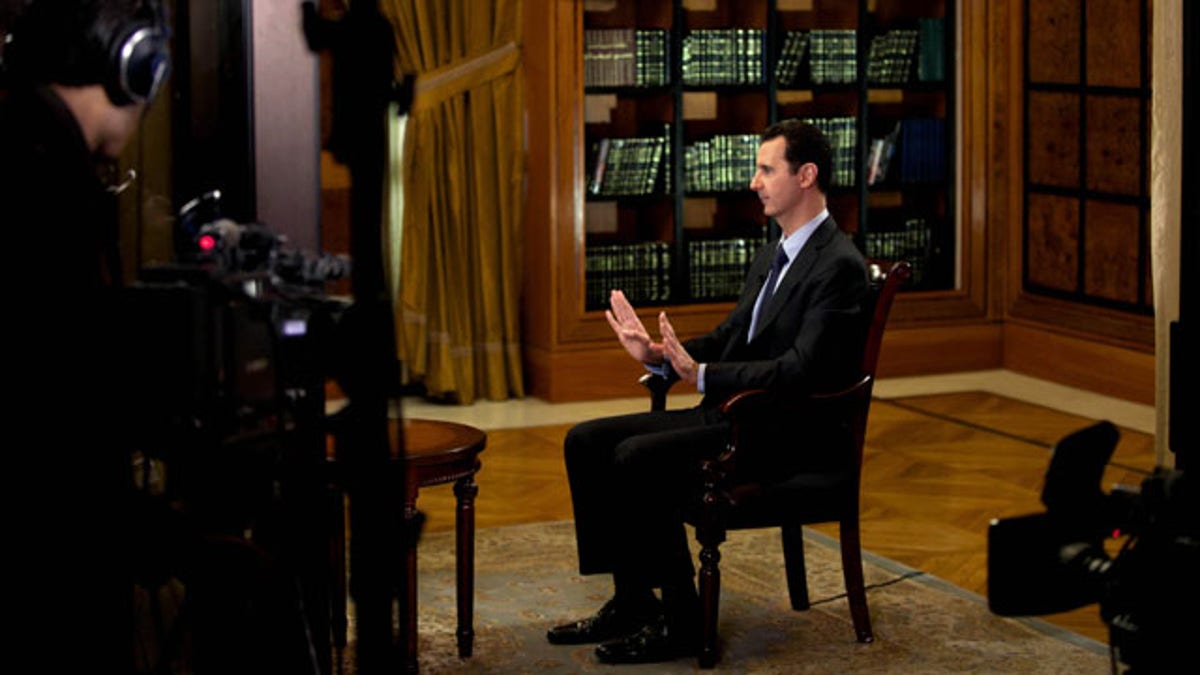
October 21, 2013: In this photo, which AP obtained from Syrian official news agency SANA and which has been authenticated based on its contents and other AP reporting, President Bashar Assad gestures as he speaks during an interview with Lebanon’s Al-Mayadeen TV, at the presidential palace in Damascus, Syria, Monday. (AP Photo)
Violent extremists seeking to overthrow Syrian President Bashar Assad may instead have hurt negotiations to replace him, frustrating Western diplomats who continue to push for his ouster as a necessary part of a peace agreement in the Mideast nation's bloody civil war.
Bolstered by infighting among Syrian opposition groups — including some linked to al-Qaida that have jeopardized foreign aid — U.S. officials say Assad has a stronger grasp on power now than he did just months ago, when the U.S. and Russia called for a new round of talks to settle the 2 1/2-year war that has killed more than 100,000 people. Still, U.S. Secretary of State John Kerry said Assad's recent gains do not assure his future in a new government.
How to persuade Assad to step down will be part of the focus Tuesday at a London meeting of 11 nations from the West and Mideast seeking a negotiated settlement to the war.
"I don't know anybody who believes that the opposition will ever consent to Bashar al-Assad being part of that government," Kerry told reporters Monday in Paris where he was participating in talks about another Mideast crisis, between Israel and Palestinian authorities.
"But I do not believe that it is dependent on whether you're up or down," Kerry said. "There's a human catastrophe awaiting the world if you can't have a negotiated solution."
Extremist groups, including the al-Qaida-linked cross-border Islamic State of Iraq and the Levant, have hurt the credibility of the fractured opposition to Assad and drawn battle lines among once-allied rebel forces. As a result, that likely has boosted Assad's confidence to resist yielding at the negotiating table, according to a second senior State Department official who spoke on condition of anonymity to discuss the delicate discussions more candidly.
In an interview Monday, Assad questioned the legitimacy of the opposition and said the factors needed for a proposed peace conference to succeed do not yet exist.
"Who are the groups that will participate? What is their relation with the Syrian people? Do they represent the Syrian people or they represent the country that made them?" Assad said during an interview with Lebanon's Al-Mayadeen TV. "There are many questions about the conference."
He said it's not clear who would represent the opposition, or what credibility they would have inside Syria. Assad also did not rule out the possibility of running for re-election as early as next year.
In Paris, Qatari Foreign Minister Khalid al-Attiyah tersely denied a question over whether his Persian Gulf nation has aided terror groups in the fight against Assad.
"Anyone who doesn't know what's happening in Syria would say that Qatar is supporting radical groups," al-Attiyah said at the same news conference as Kerry. "Talking about us supporting radical groups or extremist groups, this cannot be true in any way when we're working with allies closely."
The senior State Department official accused the al-Qaida group of — knowingly or not — helping Assad by hobbling the moderate rebel groups and diverting aid and focus from the battle against his ruling government.
It's also feared that Assad's recent willingness to let United Nations inspectors examine his government's chemical weapons stockpile — a cache that earlier this year he denied even existed — has helped his own credibility and worldwide image. The London talks also seek to assure Syria's moderate political opposition leaders that they still have widespread foreign support for demanding Assad's ouster, according to a Western diplomat who requested anonymity to discuss the meeting's agenda before it took place.
Kerry said the negotiations with Assad's government are likely to take place late next month, but would not confirm they have been set for Nov. 23, a date mentioned by other officials.
